The Mad King's Road Runs Through Japan: A Conversation with Eddie Kingston
Eddie Kingston speaks about the NJPW tour that fulfilled one of his lifelong dreams, and what that success means for his future.
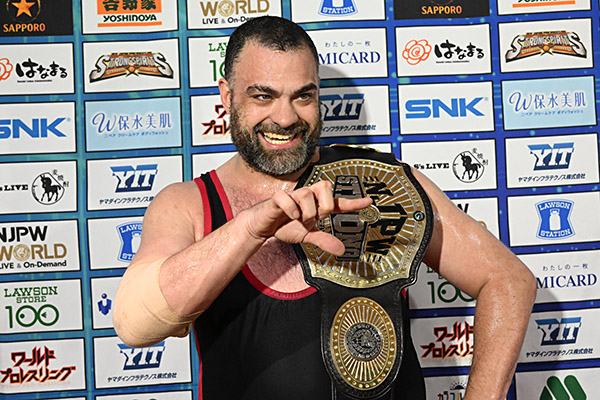
If the act of professional wrestling is a religious experience, then it has its own sacred spaces. “Korakuen,” says Eddie Kingston. “It’s holy ground for pro wrestling.”
As far as storied venues in pro wrestling go, even grander stages like the Tokyo Dome or Sumo Hall can’t compare to the sheer volume of greatness hosted within Korakuen Hall. The list of legendary names that worked within it is long, and the list of great matches might just be even longer. Any longtime fan of Japanese pro wrestling knows the venue on sight, images of it evoke equal measures comfort and awe.
For much of his life, Eddie experienced Korakuen Hall from a distance—through the hazy distortion of VHS tapes, via old matches preserved and uploaded online for people to enjoy, perhaps even through the anecdotes of peers who have had the chance to perform there themselves.
This past July, Eddie Kingston stepped foot in Korakuen Hall for the first time. Walking through the curtain and taking in the venue before the fans arrive, goosebumps rise all over his skin, a physical reaction to the intangible gravity of the venue. “I never felt this before in my life,” he says. “I can only think of wrestlers who I love. I could feel their energy, for some weird reason, I felt all of them in one rush, you know what I mean?”
“I don’t know if anyone’s ever felt that feeling. It just felt like almost out of body at that point.”
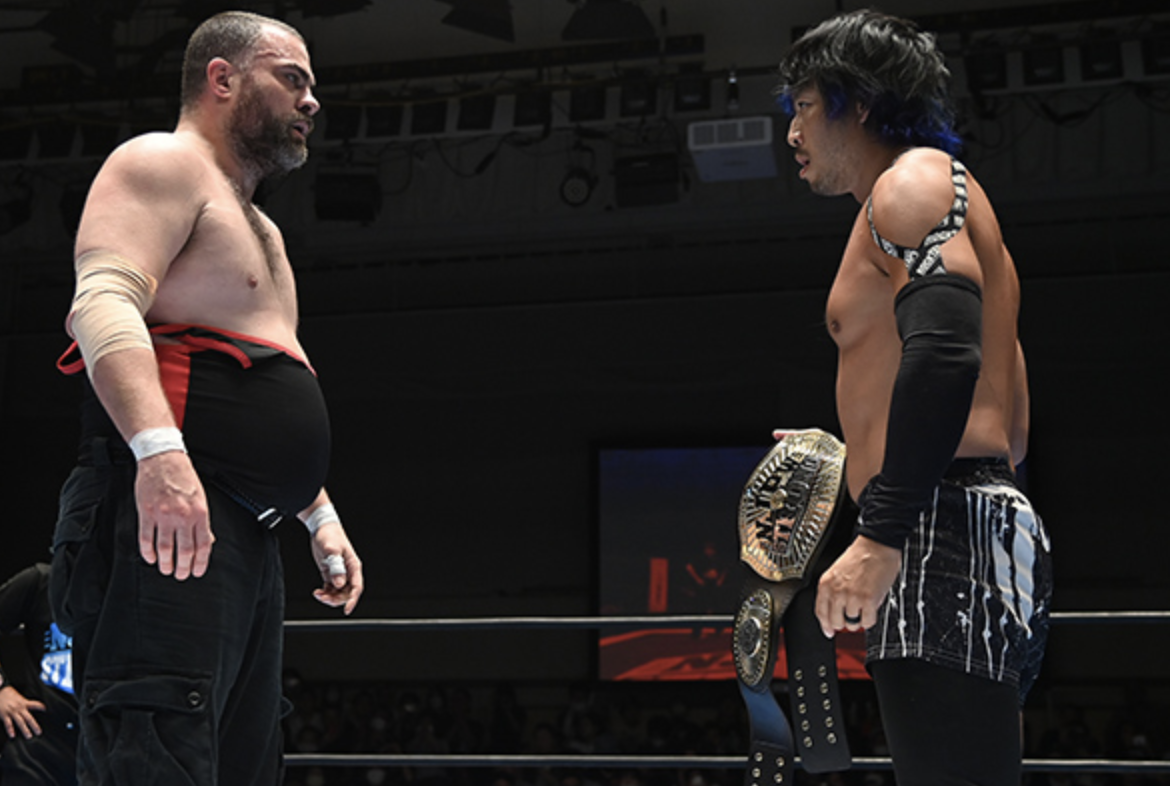
Korakuen Hall would play host to several milestone moments in this latest tour of Japan for Eddie Kingston. It’s here he would debut in Tokyo for the first night of the NJPW Independence Day double header. The following night, he defeats KENTA to win the NJPW Strong Openweight Championship—Eddie’s first ever championship sanctioned by a Japanese promotion.
“It’s a championship that needs to be built up,” he says. “I take it very, very, very serious. Almost as serious as if I was the [AEW] World’s Champion or if I was the IWGP Champion. I take it that serious.”
In the moment, Homicide joined Eddie at ringside to share in his celebration. Through the years, Eddie has consistently brought up what an important figure Homicide has been in his career. More than just a mentor in the professional wrestling industry, Eddie counts Homicide among a small circle of friends that he’d credit with simply helping him survive when things get tough.
The emotion in Eddie’s eyes when he wins the title radiates from the screen. It’s easy to tell that the title means the whole world to him. Just as powerful, however, is Homicide’s excitement for his friend.
“[Homicide’s] a real one, man. When you talk about guys who are actually happy for their friends, are happy for people they trained, like he’s legit. There’s no bullshit about it,” says Eddie. “He has love for his people, and that’s a memory that’s out more to me than the match, is him just screaming and jumping up and down like the Yankees won the World Series, that’s how happy he was.”
2023.7.5 後楽園ホール
— azu★ (@njpw_azu510) July 6, 2023
ホミサイドが自分のことの
ように喜んでいてグッときた😭✨
#エディ・キングスト #EddieKingston #ホミサイド #HOMICIDE #njpw #njpwSTRONG #AEW pic.twitter.com/i26mD85wEF
The title is a massive vote of confidence from the New Japan office, a sign that Eddie Kingston can be trusted to represent the company moving forward. For Eddie, the pressure’s on him to help elevate the fairly new championship in the eyes of an international fanbase. If that takes defending the title on AEW television, ROH on HonorClub, or the rare indie appearances he still makes, the champion is willing.
“I want to be considered a fighting champion and I also want to be considered someone who elevated that championship for the next man.”
It’s in Korakuen Hall too that Eddie’s tour of Japan would reach its creative peak. On the eighth night of the G1 Climax, Eddie clashes against a familiar foe, and even occasional partner, Tomohiro Ishii. This is the third singles match between the two, following up on two bouts in the States from the year prior. In this bout, their chemistry appears to have worked out all the initial kinks of their prior matches, leaving only the no-nonsense, hard-hitting action that the two are known for, elevated by both wrestlers’ keen sense of timing and selling.
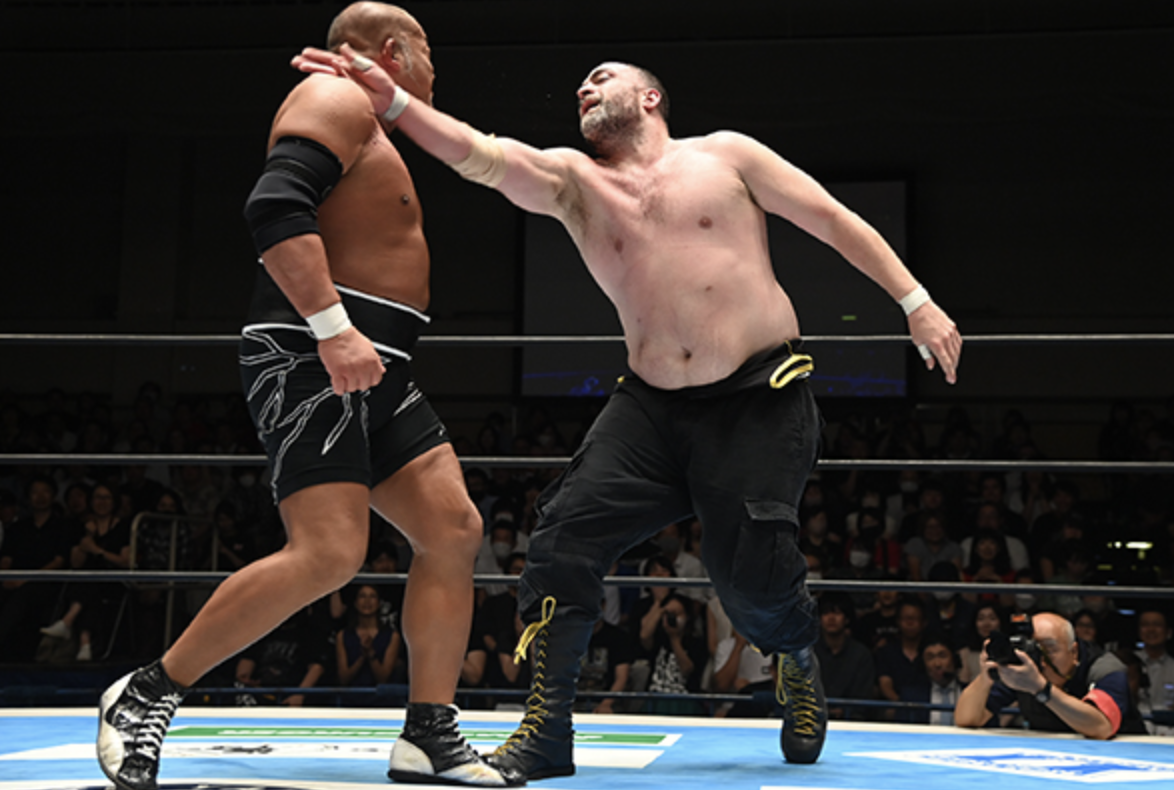
“I feel that we're kind of made for each other. I'm the maybe the American version of what he likes and he's a Japanese version of what I like,” says Eddie. “We just have—I wouldn’t say the same fighting style—but a fighting style that matches.”
The familiarity that comes from being regular rivals is a double-edged sword though. Much of the match saw Ishii focusing on Kingston’s bad back, wearing it down to the point that Kingston became susceptible to Ishii’s vertical drop brainbuster. As is true for so much of Eddie Kingston’s best work in the ring, the match ends in a loss.
Eddie, do your best.
Eddie Kingston first flew out to Japan in the summer of 2011. The tour was part of an exchange of talent between CHIKARA and Osaka Pro. As part of it, Eddie was joined by fellow CHIKARA wrestlers Fire Ant and Soldier Ant, better known in later years as Orange Cassidy and Drew Gulak respectively. On this tour, Eddie Kingston wrestled five matches across just as many days.
“We had one day off, so I wrestled every day like I wanted. Because of that tour, I call Osaka my second home.”
With such a busy and full schedule though, the trip passed Eddie by quicker than he expected. “I never appreciated the first time I went to Osaka. I was always worried about when am I going to come back,” he says. “I didn’t want to leave, I got choked up getting on the plane.”
Twelve years later when he got the call to be a part of the G1 Climax, Eddie Kingston decided that this time would be different.
“I promised myself on this tour, doesn't matter when I'm coming back, [just] enjoy every moment of it.”
Even that presented its challenges though. For a wrestler who regularly cites himself as his own worst critic, there were some natural doubts and hesitations that plagued Eddie’s mind the moment he landed back in Japan for the G1. “Am I good enough? What am I doing here? Should I have said yes? Should I just been like, ‘Nah, give it to someone else?’ Am I going to embarrass myself? Are the Japanese fans going to see me as like a mark or playing cosplay?”
Self-doubt gets harder to quell after an already delayed hours-long flight to Japan. Upon landing, Eddie gets driven straight to the ongoing G1 press conference, there’s hardly a moment to stop and process a thing. It’s only after Eddie’s first match of the tournament against Shingo Takagi that he’s able to take a breath and examine his situation.
“After that match, I was like okay, I feel good.”
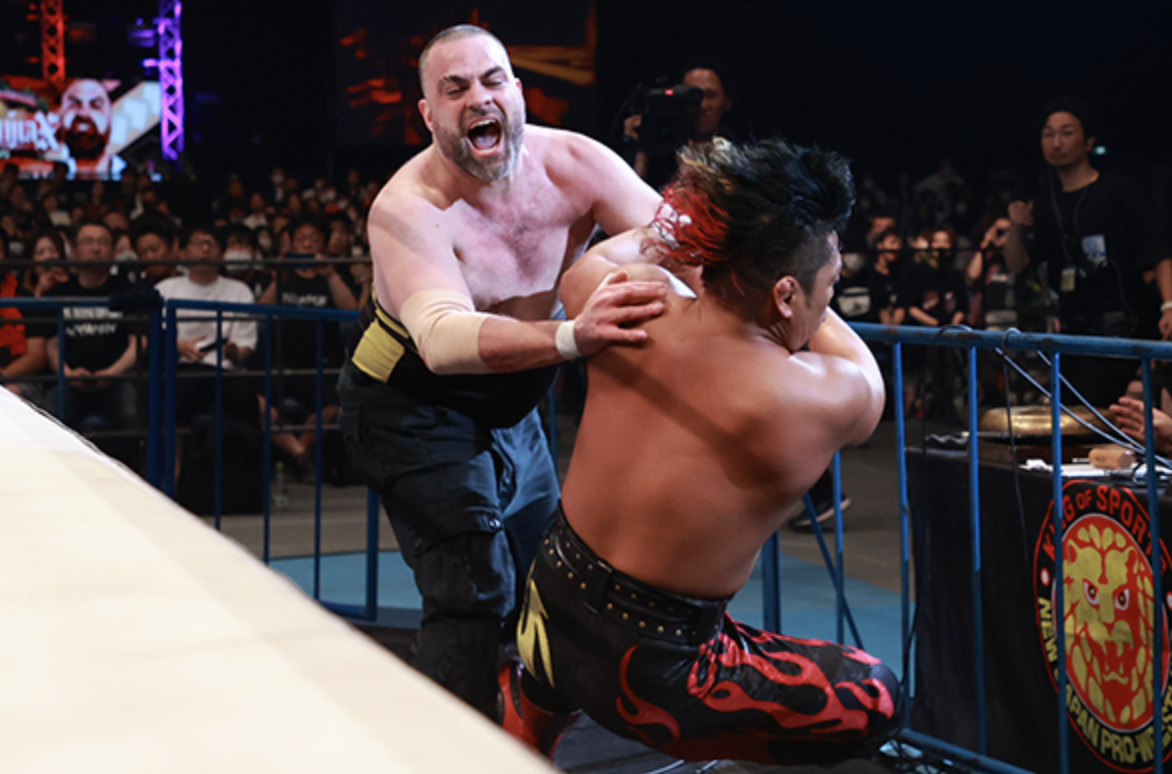
From that point forward, a sense of peace settled on Eddie Kingston’s shoulders—an unfamiliar feeling for him, to say the least. “It’s new,” he says. “The only other time I feel free is when I’m in the ring. When I say free, I mean I don’t worry about anything. I don’t worry about bills, I don’t worry about what’s going on in the world of wrestling, or even in the world. I’m just focused on my job, you know? And I kind of feel fearless.”
Life for a wrestler in the G1 Climax is built on routine. On show days, he’s picked up to get to the venue early. The time before the performance is important, especially just for mentally preparing for the arduous toll that each match brings. Beyond just the brutal strikes and bruising bumps that any wrestler confronts at any time, there’s another unseen force that Eddie Kingston has to overcome every night on the tour.
“I did not know Japan gets that hot, oh my god. It’s like a different kind of heat, man,” he says. “I thought I could deal with it living in Florida. Nope. Different type of heat, man. So that really got me, it was so grueling.”
Days off on the tour get spent trying to recover for the upcoming nights of action. Eddie interchanged between hot Epsom salt baths or ice baths to soothe the muscle swelling caused by the exertion. There’s exploring the local cuisine from octopus with kimchi to convenience store onigiri. Then, to keep up conditioning, there’s days spent at the gym with the pass gifted to New Japan roster members.
“I forgot [my Gold’s Gym pass] once and I said, ‘Shin Nihon Puroresu, I’m here working for them.’ And they went, ‘Okay, go.’”
The rhythm of travelling from town to town proved a familiar one to Eddie Kingston, an old melody his body had attuned to years ago. “It reminded me of my indie days where I would have to wrestle to pay rent and the mortgage. So I was out Thursday morning, flying in the day of the show, 5 AM. Leaving from that show Saturday, either in a car or flying at 5 AM. Then Sunday, doing the same thing. A car or a flight, 5 AM.”
On this tour, Eddie’s not fighting to survive through the day though. Instead, he’s fighting for something he’s been scrapping and clawing for from his first day in pro wrestling: respect. In particular, the validation of a fanbase and a roster that has meant so much to his love of professional wrestling.
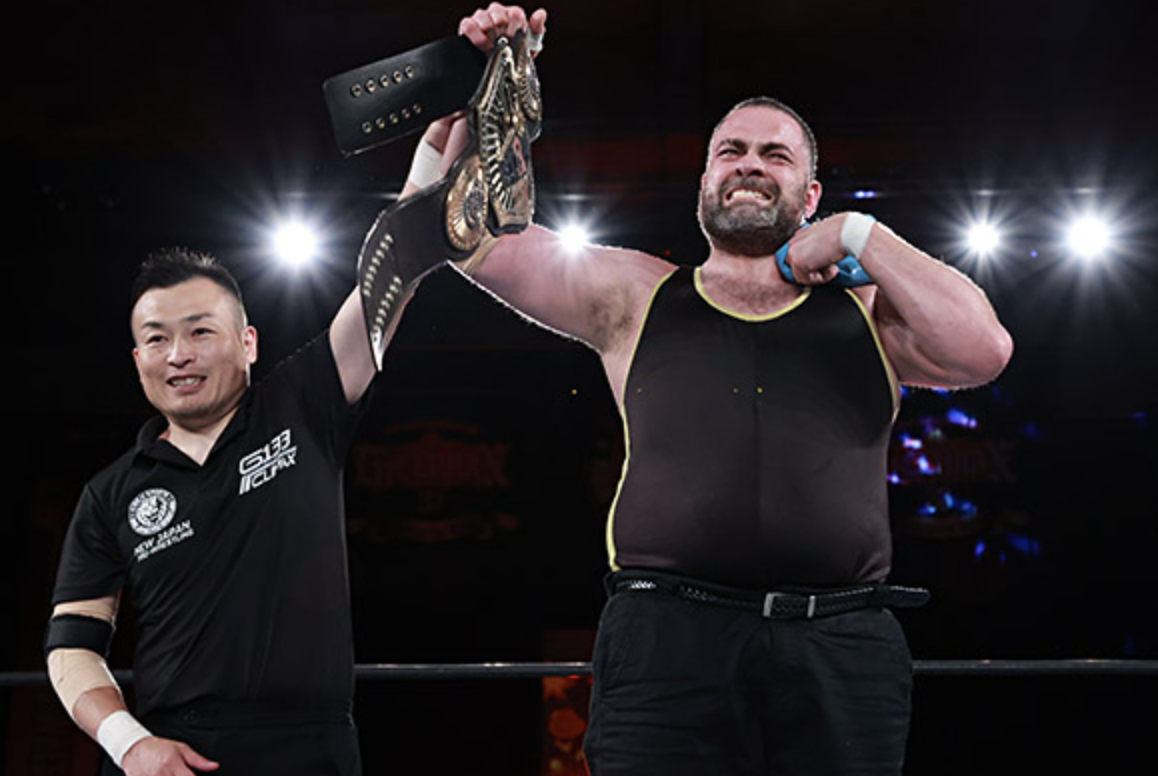
Japanese crowds received Eddie warmly, from the moment he stepped foot in Korakuen Hall for the Independence Day shows in July. This came into clarity for Eddie one night in Nagoya while wrestling Mikey Nicholls. Again, the heat in Japan, all the bright lights bearing down on the ring. Within minutes, of the opening bell, Nicholls nails a back suplex, landing Eddie square on his neck and shoulders. Kingston immediately rolls out of the ring after absorbing the impact. Pins and needles are shooting up his arm.
“I was like, oh I better finish this quick or you know, something’s wrong. Let’s get [Nicholls] away from me so I can stretch my neck a little bit.”
Eddie can’t escape the action for long though as Nicholls follows him to the floor to continue the attack. All the while, just discernible on the broadcast, a high-pitched child’s voice rings out in the Aichi Prefectural Gymnasium. In the arena though, the voice can be heard loud in clear, even in the ring where Eddie keeps fighting.
“I don’t speak Japanese so I couldn’t understand them,” says Eddie. “I got to the back and I ask Oskar [Leube], ‘Man, you heard that one kid? Like what were they saying?’ And he said, ‘Eddie, do your best.’ That’s all he kept screaming throughout that whole match and at that point, I said, okay, I arrived."
“I am overwhelmed. Surprised, really. Really, really surprised when any fan likes me.”
Just as important, if not more so, was earning the respect of the New Japan roster backstage. There were his contemporaries, of course, especially those he shared a G1 block with. No matter what anyone else had to say about them, or even his own personal feelings about each individual, Eddie Kingston had a healthy respect for his competitors in the G1.
“They were all top of their game. It’s the G1, I like to think that you wouldn’t be invited to the G1 if you weren’t on a certain level,” he says. “They all stepped their game up…every match was rough and tough.”
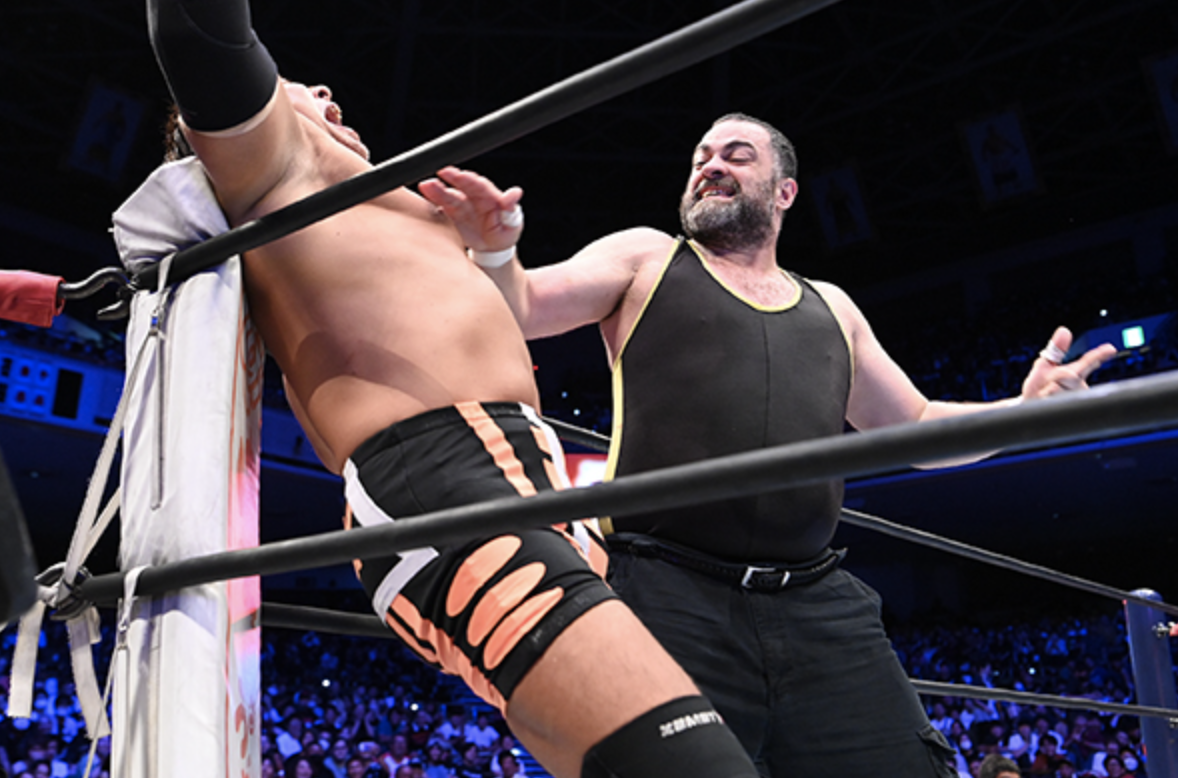
But beyond his contemporaries, Eddie has always looked to the legends of past generations. He wanted his love for Japanese pro wrestling to become apparent to the likes of Hiroshi Tanahashi, Satoshi Kojima, Hiroyoshi Tenzan, and more who helped lay the foundations for the success New Japan has seen since the 2010s.
“I didn’t take that lightly.”
Eddie got the chance to display his passion to these legends directly. On the last night of the tour, he teamed with Ishii, YOH, & Tanahashi against Tenzan, Kojima, Tiger Mask, & Togi Makabe. The venue? None other than Sumo Hall, a venue synonymous with the G1. Through the years, it’s been the regular home of the G1 finals going all the way back to the inaugural finals in 1991.
“I just enjoyed every moment. That’s why you can see me kind of looking around at Sumo Hall and just taking a deep breath and taking it all in.
“I couldn’t stop thinking about how my uncle passed away at 32. He always wanted to umpire a Major League Baseball game. He moved his way up, started doing college, and then he passed away. He didn’t really get to live his dream that he wanted to do…. Not a lot of people get to [live their dreams] and I was like, enjoy this.”
Kawada
Outside of the ring, one of the many highlights of Eddie Kingston’s time in Japan came as a surprise to him. On one of his days off, TV Asahi informed him that they would be driving him to a scheduled interview appearance. Instead, though they found themselves outside of a ramen shop with a familiar logo outside.
“I guess it’s like a parking sign, again can’t read Japanese, but I see the little figure of Kawada, the drawing of it,” says Eddie. “It was a great, unbelievable surprise.”
Eddie has spoken extensively about the influence the Four Pillars of Heaven have had on his career. Of the four, the one whose journey has seemed to parallel Eddie Kingston’s own has always been Toshiaki Kawada. The seemingly constant uphill battle against more naturally gifted competitors, the regular history of leg injuries, the feeling that both are always just on the periphery of the highest levels of success. There’s good reason that more often than not, Eddie Kingston wears yellow and black to the ring.
That first-time encounter between Eddie and Kawada was captured and uploaded to New Japan’s official social media pages. The genuine surprise and joy from Kingston radiated off the screen, it was clear how moving it was for him to finally get the chance to speak to one of his greatest heroes.
“Sitting down with him and some of the things I told him offscreen and some the things he told me offscreen, I will hold forever dear. And it was translated to me and sent to me and I read it every day, the advice he gave me. I read it every day because why wouldn’t I?”
Eddie has always placed value on being earnest in his tributes to the legends of the past, in spite of the criticisms of some of his contemporaries. “These are guys who made me, made my style, made me fall in love with pro wrestling. These were the guys, and you could say ‘mark’ or ‘fan’ or whatever, man. I tell everyone, this is probably the only good thing I heard from one old timer—I forgot who it was but he didn’t say a lot of good things—but one good thing he did say was, ‘We’re the biggest marks of them all, because we decided to make a living out of this.’
“Life is short, let the people you know, who you respected and still respect throughout the years, when you see them, let them know. Take a picture if you want, tell them how this match or this moment or that made you feel something. I tell everybody, we’re not in the pro wrestling business, we’re in the emotion business. I want you to feel something.”
Eddie Kingston would get to converse with Toshiaki Kawada yet again as part of this year’s Starrcast. With Sonny Onoo acting as translator, Eddie interviewed Kawada about his career in All Japan and beyond. On reflecting on the past, however, Kawada touched on the harsh realities of the future for any pro wrestler dedicated to the kind of breakneck physicality that characterizes so much of Japanese wrestling. Kawada, along with all The Four Pillars, paid a tremendous physical price for the art they created. And that’s a reality that’s not lost on Eddie Kingston, who has already had to get surgery to heal injuries and this year and still keeps working at far from a hundred percent.
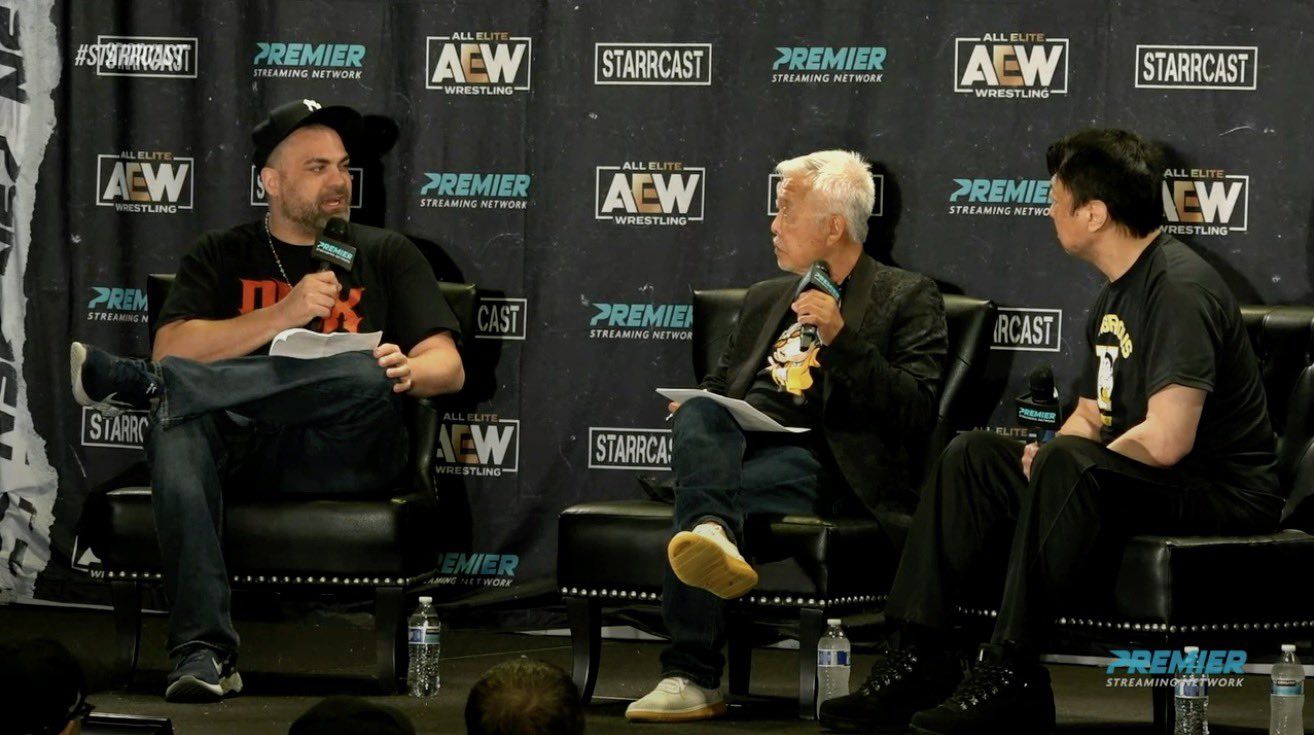
“In my mind, I went, ‘I understand it.’ I understand why that has happened but I also understand why they did it and it’s not going to slow me down, and the future doesn’t scare me as long as I give everything I have for what I love to do. I could be in a wheelchair when I’m 80 or—God willing I make it to 80—or I can have bad knees and a bad neck after I’m done with this. But to me, even now when I wake up sore and beat up, and I gotta stretch and I’m cracking things, and you know things aren’t the same like there were when I was in my 20s, it’s all worth it.
“This is just part of the sacrifice. [Kawada’s words] didn’t make me pause, it just made me go I understand,” he says. “I guess you could say all wrestlers, whether what style they do, they’re making the sacrifice. And we all know what it is…. This is the price we all have to pay, and we knew it.”
The Altar of Professional Wrestling History
Kawada’s words would ring true for Eddie Kingston in other ways too. In their interactions both in the United States and Japan, Kawada teased Eddie for his recent use of the Northern Lights Bomb to win matches. A powerbomb, Kawada insisted, would be the way to go.
In many ways, Eddie Kingston’s double title match against Claudio Castagnoli at AEW Dynamite Grand Slam would be his most overt tribute to Kawada and the King’s Road style yet. From the production choice to follow the combatants from the backstage area as they made their entrances, to Claudio Castagnoli donning the traditional Misawa colors of green and silver to contrast Eddie’s black and gold, the bout was rife with homages to the history that Eddie Kingston has held so dear throughout his career.
The Northern Lights Bomb couldn’t get Eddie the win on that night, but the powerbomb did.
If pro wrestling has sacred spaces, then Arthur Ashe stadium might yet to attain its status as consecrated ground. These things don’t happen in the blink of an eye, they take years and years to build. History informs the value of a place, it’s a value found only with the benefit of time and hindsight.
Eddie Kingston worships at the altar of professional wrestling history, and if there’s anything he’s absorbed from it, it’s that time stays still for no man.
“For me, still competing, it’s more pressure, which I don’t mind,” he says. “[It’s a pressure] to do better. Never to just to keep it up, you always want to be better…. That’s all it is. That’s life.”